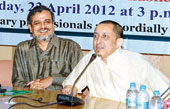 |
| Swapan Chakravorty and (right) Abhijit Gupta at the workshop. Picture by Bishwarup Dutta |
How often do we record what we read? Never. And therein lies the challenge of writing a history of book reading, explained Abhijit Gupta, a reader in English at Jadavpur University, at National Library on World Book Day.
The topic of the workshop, organised at the Bhasha Bhavan auditorium on April 23 to mark the occasion, was History of the Books in India: Prospects and Challenges.
“Instead of making World Book Day only about libraries and books, we wanted to delve deeper into the history of books and in its light, the economics and sociology of book production,” said Swapan Chakravorty, the director-general of National Library, Calcutta.
Gupta provided an enthusiastic and interesting overview of the subject. Interesting information on a range of topics, from the reading of prohibited books and police interrogation reports to the change in reading habit on trains from London to Liverpool in the 1960s, peppered his talk.
One of the most interesting stories was about the 1922 edition of Ulysses that James Joyce had divided into 732 pages, each narrating the events over 12 hours of every day in 1904, a leap year. None of the later editions of the novel was published according to Joyce’s specifications.
The Indian works on the history of books, ranging from the one by B.S. Kesavan, the first national librarian of independent India, to the recent endeavours by Chakravorty and Gupta, were discussed at the workshop. Citing the methods of maintaining records in the West, Gupta wished that Indian publishers too submitted published materials to National Library and helped in record-keeping. Digitised record-keeping and its drawbacks were also discussed. The event ended with an interactive session.











